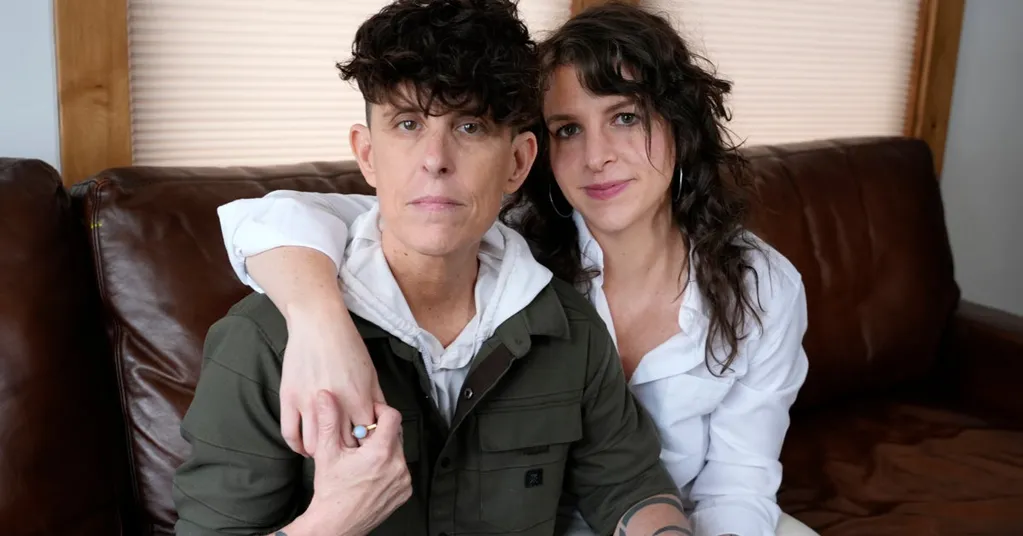A film documenting the poet and their wife's enduring love in the face of Gibson's cancer diagnosis is set to air on Apple TV+ this fall.
Andrea Gibson, a celebrated poet and performance artist who through their verse explored gender identity, politics and their 4-year battle with terminal ovarian cancer, died Monday at age 49.
Gibson's death was announced on social media by their wife, Megan Falley. Gibson and Falley are the main subjects of the documentary "Come See Me in the Good Light," winner of the Festival Favorite Award this year at the Sundance Film Festival and scheduled to air this fall on Apple TV+.
"Andrea Gibson died in their home (in Boulder, Colorado) surrounded by their wife, Meg, four ex-girlfriends, their mother and father, dozens of friends, and their three beloved dogs," Monday's announcement reads in part.
The film -- exploring the couple's enduring love as Gibson battles cancer -- is directed by Ryan White and includes an original song written by Gibson, Sara Bareilles and Brandi Carlile. During a screening at Sundance in January that left much of the audience in tears, Gibson said they didn't expect to live long enough to see the documentary.
Tributes poured in Monday from friends, fans and fellow poets who said Gibson's words had changed their lives -- and, in some cases, saved them. Many LGBTQ+ fans said Gibson's poetry helped them learn to love themselves. People with cancer and other terminal illnesses said Gibson made them less afraid of death by reminding them that we never really leave the ones we love.
In a poem Gibson wrote shortly before they died, titled "Love Letter from the Afterlife," they wrote: "Dying is the opposite of leaving. When I left my body, I did not go away. That portal of light was not a portal to elsewhere, but a portal to here. I am more here than I ever was before."
Linda Williams Stay was "awestruck" when her son, Aiden, took her to hear Gibson perform at a bar in San Francisco a decade ago. Their poetry was electrifying, lighting up the room with laughter, tears and love. Gibson's poetry became a shared interest for the mother and son, and eventually helped Stay better understand her son when he came out as transgender.
"My son this morning, when he called, we just sobbed together," Stay said. "'He says, 'Mom, Andrea saved my life.''"
"I know," she responded.
Gibson's poetry later helped Stay cope with a cancer diagnosis of her own, which brought her son back home to St. George, Utah, to help take care of her. They were delighted when Gibson accepted their invitation to perform at an event celebrating the LGBTQ+ community in southern Utah.
"It was truly life-changing for our community down there, and even for our allies," Stay said. "I hope that they got a glimpse of the magnitude of their impact for queer kids in small communities that they gave so much hope to."
Gibson was born in Maine and moved to Colorado in the late 1990s, where they had served the past two years as the state's poet laureate. Their books included "You Better Be Lightning," "Take Me With You" and "Lord of the Butterflies."
Colorado Gov. Jared Polis said Monday that Gibson was "truly one of a kind" and had "a unique ability to connect with the vast and diverse poetry lovers of Colorado."
In a 2017 essay published in Out magazine, Gibson remembered coming out at age 20 while studying creative writing at Saint Joseph's College of Maine, a Catholic school. Identifying as genderqueer, Gibson wrote that they didn't feel like a boy or a girl and cited a line of their poetry: "I am happiest on the road/ When I'm not here or there -- but in-between."
Comedian Tig Notaro, an executive producer on the documentary and Gibson's friend of 25 years, shared on Instagram how the two came up together as performers in Colorado. Hearing Gibson perform for the first time was like witnessing the "pure essence of an old-school genuine rock star," and their words have guided Notaro through life ever since, she said.
"The final past few days of Andrea's life were so painful to witness, but simultaneously one of the most beautiful experiences of all of our lives," Notaro said. "Surrounded by real human connection unfolding in the most unlikely ways during one of the most devastating losses has given me a gift that I will never be able to put into meaningful words."
Gibson's illness inspired many poems about mortality, depression, life and what happens next. In the 2021 poem "How the Worst Day of My Life Became My Best," Gibson declared "When I realized the storm/was inevitable, I made it/my medicine." Two years later, they wondered: "Will the afterlife be harder if I remember/the people I love, or forget them?"
